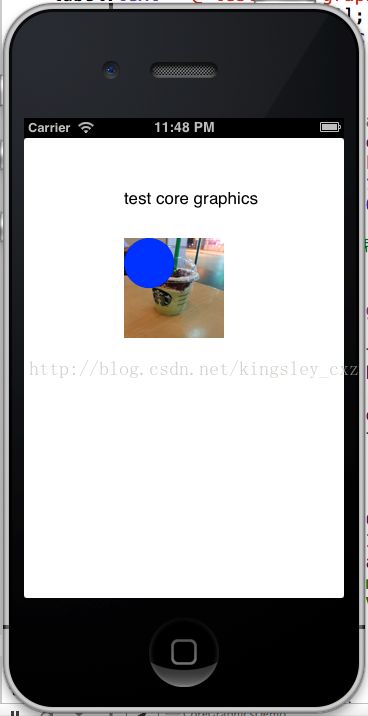Core Graphics之CGContext详解
CGContext又叫图形上下文,相当于一块画布,以堆栈形式存放,只有在当前context上绘图才有效。iOS有分多种图形上下文,其中UIView自带提供的在drawRect:方法中通过UIGraphicsGetCurrentContext获取,还有专门为图片处理的context,UIGraphicsBeginImageContext函数生成,还有pdf的context等等。
1.一共有3种使用context的场景,其中每种场景都有2种方法绘图
场景1:
//通过UIView的子类的drawRect:在上下文中绘制,该方法系统已准备好一个cgcontext,并放置在上下文栈顶,rect形参就是context的尺寸大小
//当一个UIView的backgroundColor为nil和opaque为YES时,产生的context的背景就为黑色的
- (void)drawRect:(CGRect)rect
{
//1.使用UIKit在context上绘制,UIKit的所有操作只会在当前栈顶的context,所以需要注意当前栈顶的context是否你需要操作的上下文
//UIImage,NSString,UIBezierPath,UIColor等可以直接在当前context上操作
UIImage* image = [UIImage imageNamed:@"test.png"];
NSLog(@"size:%@",NSStringFromCGSize(image.size));
//UIImage直接在context上操作,指定在context的哪个坐标上绘制,大小是原图的尺寸,如果大小超出了context的范围就会被截取掉
// [image drawAtPoint:CGPointMake(100, 100)];
//指定在context的哪个坐标上绘制,并指定绘制的图片尺寸大小,这样图片的尺寸就会被压缩,不会超出context范围
[image drawInRect:CGRectMake(0, 0, rect.size.width/2, rect.size.height/2)];
//2.使用Core Graphics的函数在context上绘制,Core Graphics的函数需要context作为参数,只绘制在指定使用的context上
//功过UIGraphicsGetCurrentContext函数获取当前上下文栈顶的context,UIView系统已为其准备好context并存放在栈顶了
// CGContextRef context = UIGraphicsGetCurrentContext();
// //画一个椭圆
// CGContextAddEllipseInRect(context, CGRectMake(0,0,100,100));
// //填充颜色为蓝色
// CGContextSetFillColorWithColor(context, [UIColor blueColor].CGColor);
// //在context上绘制
// CGContextFillPath(context);
场景2:
//实现该方法,用于CALayer回调,CALayer通过它的代理类来进行绘图操作,切记千万不能把UIView作为CALayer的代理类,因为UIView自身有隐式的图层,若再把显式的图层赋给它会发生不知名错误的
- (void)drawLayer:(CALayer*)layer inContext:(CGContextRef)ctx
{
//1.使用UIKit进行绘制,因为UIKit只会对当前上下文栈顶的context操作,所以要把形参中的context设置为当前上下文
UIGraphicsPushContext(ctx);
UIImage* image = [UIImage imageNamed:@"test.png"];
//指定位置和大小绘制图片
[image drawInRect:CGRectMake(0, 0,100 , 100)];
UIGraphicsPopContext();
// UIGraphicsPushContext(ctx);
//2.使用Core Graphics进行绘制,需要显式使用context
// //画一个椭圆
// CGContextAddEllipseInRect(ctx, CGRectMake(0,0,100,100));
// //填充颜色为蓝色
// CGContextSetFillColorWithColor(ctx, [UIColor blueColor].CGColor);
// //在context上绘制
// CGContextFillPath(ctx);
// UIGraphicsPopContext();
}
LayerDelegate* delegate = [[LayerDelegate alloc]init];
CALayer* layer = [CALayer layer];
layer.anchorPoint = CGPointMake(0, 0);
layer.position = CGPointMake(100, 100);
layer.bounds = CGRectMake(0, 0, 200, 200);
layer.delegate = delegate;
//需要显式调用setNeedsDisplay来刷新才会绘制layer
[layer setNeedsDisplay];
[self.view.layer addSublayer:layer];
下图为场景1和场景2的显示效果:
场景3:
//通过自己创建一个context来绘制,通常用于对图片的处理
/*
解释一下UIGraphicsBeginImageContextWithOptions函数参数的含义:第一个参数表示所要创建的图片的尺寸;第二个参数用来指定所生成图片的背景是否为不透明,如上我们使用YES而不是NO,则我们得到的图片背景将会是黑色,显然这不是我想要的;第三个参数指定生成图片的缩放因子,这个缩放因子与UIImage的scale属性所指的含义是一致的。传入0则表示让图片的缩放因子根据屏幕的分辨率而变化,所以我们得到的图片不管是在单分辨率还是视网膜屏上看起来都会很好。
*/
//该函数会自动创建一个context,并把它push到上下文栈顶,坐标系也经处理和UIKit的坐标系相同
UIGraphicsBeginImageContextWithOptions(rect.size, NO, 0);
CGContextRef context = UIGraphicsGetCurrentContext();
CGContextAddEllipseInRect(context, CGRectMake(0,0,100,100));
//填充颜色为蓝色
CGContextSetFillColorWithColor(context, [UIColor blueColor].CGColor);
//在context上绘制
CGContextFillPath(context);
//把当前context的内容输出成一个UIImage图片
UIImage* i = UIGraphicsGetImageFromCurrentImageContext();
//上下文栈pop出创建的context
UIGraphicsEndImageContext();
[i drawInRect:CGRectMake(0, 0, 100, 100)];
下图为绘制的显示效果:
2.把整个屏幕转化为图片
UIImageView* imageV = [[UIImageView alloc]initWithFrame:CGRectMake(0, 0, self.view.frame.size.width, self.view.frame.size.height)];
UIGraphicsBeginImageContextWithOptions(imageV.frame.size, NO, 0);
CGContextRef context = UIGraphicsGetCurrentContext();
//把当前的整个画面导入到context中,然后通过context输出UIImage,这样就可以把整个屏幕转化为图片
[self.view.layer renderInContext:context];
UIImage* image = UIGraphicsGetImageFromCurrentImageContext();
imageV.image = image;
UIGraphicsEndImageContext();
3.剪裁图片
//对一张图片进行剪裁
CGImageRef imageref = CGImageCreateWithImageInRect(image.CGImage, CGRectMake(100, 100, 200, 50));
UIImageView* cropImage = [[UIImageView alloc]initWithFrame:CGRectMake(100, 300, 200, 50)];
cropImage.image = [UIImage imageWithCGImage:imageref];
CGImageRelease(imageref);
[self.view addSubview:cropImage];
下图下放的是剪裁后的图片效果:


